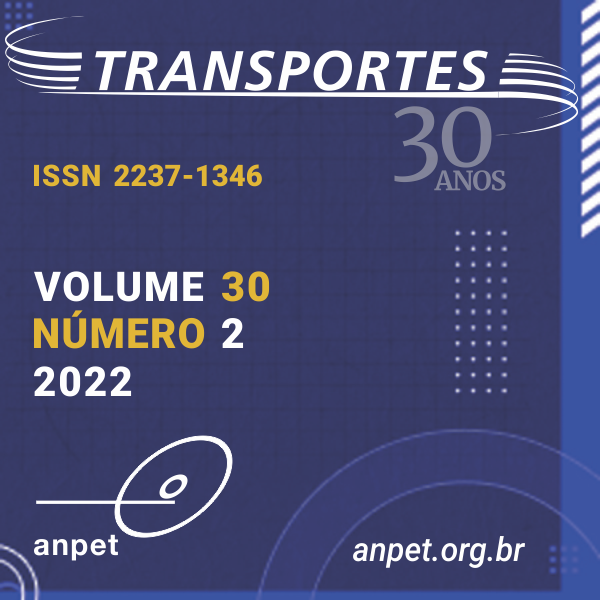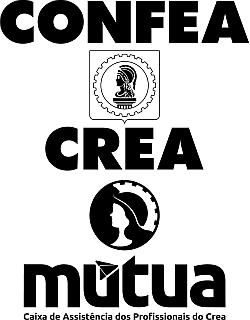Percepção e escolha do modo de transporte: análise fatorial descritiva e exploratória de um questionário piloto aplicado aos estudantes da UFRRJ (Universidade Federal Rural do Rio de Janeiro)
DOI:
https://doi.org/10.14295/transportes.v30i2.2696Palavras-chave:
Comportamento em transporte, Estudantes universitários, Análise fatorial exploratóriaResumo
As universidades geram um volume significativo de deslocamentos diários, além de ser um ambiente favorável ao desenvolvimento de novos hábitos e comportamentos, em decorrência da influência exercida entre seus frequentadores. Este estudo aplicou um inquérito, baseado nas Teorias do Comportamento Planeado e da Motivação Humana, aos estudantes da UFRRJ, com o objetivo de identificar fatores relevantes para decisões em transporte e coletar suas percepções sobre o sistema de transporte na região metropolitana do Rio de Janeiro. Os resultados foram alcançados por análise fatorial exploratória e entrevistas. Os resultados corroboram a já consolidada aplicação da Teoria do Comportamento Planeado nas pesquisas sobre transporte e confirma a existência de uma hierarquia de necessidades de transporte sugerida pela Teoria da Motivação Humana, o que destaca seu potencial como ferramenta de apoio à decisão no desenvolvimento de políticas de transporte. O estudo evidenciou ainda a relevância do tempo de viagem sobre outras necessidades, a forte influência dos atributos de segurança nas decisões de mobilidade e uma elevada consciência do papel social e inclusivo do transporte.
Downloads
Referências
Ajzen I (1991) The theory of planned behavior. Organizational Behavior and Human Decision Processes 50(2): 179–211. DOI: 10.1016/0749-5978(91)90020-T. DOI: https://doi.org/10.1016/0749-5978(91)90020-T
Allen J, Muñoz JC and Ortúzar J de D (2019) Understanding public transport satisfaction: Using Maslow’s hierarchy of (transit) needs. Transport Policy 81. Elsevier Ltd: 75–94. DOI: 10.1016/j.tranpol.2019.06.005. DOI: https://doi.org/10.1016/j.tranpol.2019.06.005
Bamberg S and Schmidt P (2003) Incentives, Morality, or Habit? Predicting Students’ Car Use for University Routes with the Models of Ajzen, Schwartz, and Triandis. ENVIRONMENT AND BEHAVIOR 35(2): 264–285. DOI: 10.1177/0013916502250134. DOI: https://doi.org/10.1177/0013916502250134
Bamberg S, Fujii S, Friman M, et al. (2011) Behaviour theory and soft transport policy measures. Transport Policy 18(1): 228–235. DOI: 10.1016/j.tranpol.2010.08.006. DOI: https://doi.org/10.1016/j.tranpol.2010.08.006
Brace I (2008) Questionnaire Design: How to Plan, Structure and Write Survey Material for Effective Market Research. 2nd ed. Londin: Kogan Page Ltd.
Bradburn NM, Sudman S and Wansink B (2004) Asking Questions: The Definitive Guide to Questionnaire Design - for Market Research, Political Polls and Social and Health Questionnaires. 1st ed. San Francisco, CA: John Wiley & Sons, Inc.
Brög W (2015) Surveys on daily mobility are not “surveys to go.” In: Transportation Research Procedia, 2015, pp. 98–107. Elsevier. DOI: 10.1016/j.trpro.2015.12.009. DOI: https://doi.org/10.1016/j.trpro.2015.12.009
Brown TA (2015) Confirmatory Factor Analysis for Applied Research Methodology in the Social Sciences. 2nd ed. New York: The Guilford Press. Available at: www.guilford.com/MSS.
Cadima C, Silva C and Pinho P (2020) Changing student mobility behaviour under financial crisis: Lessons from a case study in the Oporto University. Journal of Transport Geography 87. Elsevier Ltd: 102800. DOI: 10.1016/j.jtrangeo.2020.102800. DOI: https://doi.org/10.1016/j.jtrangeo.2020.102800
Cepeda Zorrilla M, Hodgson F and Jopson A (2019) Exploring the influence of attitudes, social comparison and image and prestige among non-cyclists to predict intention to cycle in Mexico City. Transportation Research Part F: Traffic Psychology and Behaviour 60. Elsevier Ltd: 327–342. DOI: 10.1016/j.trf.2018.10.009. DOI: https://doi.org/10.1016/j.trf.2018.10.009
Cui L, Wang Y, Chen W, et al. (2021) Predicting determinants of consumers’ purchase motivation for electric vehicles: An application of Maslow’s hierarchy of needs model. Energy Policy 151. Elsevier Ltd: 112167. DOI: 10.1016/j.enpol.2021.112167. DOI: https://doi.org/10.1016/j.enpol.2021.112167
Field A (2018) Discovering Statistics Using IBM SPSS Statistics. 5th ed. California: SAGE Publications Inc.
Fishbein M and Ajzen I (2009) Predicting and Changing Behavior: The Reasoned Action Approach. 1st ed. Psychology Press. DOI: 10.4324/9780203838020. DOI: https://doi.org/10.4324/9780203838020
Fowler FJ (1995) Improving Survey Questions: Design and Evaluation (ed. S McElroy). 1st ed. California: SAGE Publications, Inc.
Fowler FJ (2014) Survey Research Methods. 5th ed. California: SAGE Publications, Inc.
Ghatak S and Singh S (2019) Examining Maslow’s Hierarchy Need Theory in the Social Media Adoption. FIIB Business Review 8(4): 292–302. DOI: 10.1177/2319714519882830. DOI: https://doi.org/10.1177/2319714519882830
Gilal FG, Paul J, Gilal NG, et al. (2021) The role of organismic integration theory in marketing science: A systematic review and research agenda. European Management Journal. Elsevier Ltd. DOI: 10.1016/j.emj.2021.02.001. DOI: https://doi.org/10.1016/j.emj.2021.02.001
Hasan RA, Abbas AH, Kwayu KM, et al. (2019) Role of social dimensions on active transportation and environmental protection: A survey at the University of Samarra, Iraq. Journal of Transport and Health 14. Elsevier Ltd: 100564. DOI: 10.1016/j.jth.2019.05.003. DOI: https://doi.org/10.1016/j.jth.2019.05.003
Kerr A, Lennon A and Watson B (2010) The call of the read: factors predicting students’ car travelling intentions and behavior. Transportation (37): 1–13. DOI: 10.1007/s11116-009-9217-9. DOI: https://doi.org/10.1007/s11116-009-9217-9
Ko J, Lee S and Byun M (2019) Exploring factors associated with commute mode choice: An application of city-level general social survey data. Transport Policy 75. Elsevier Ltd: 36–46. DOI: 10.1016/j.tranpol.2018.12.007. DOI: https://doi.org/10.1016/j.tranpol.2018.12.007
Kwon HR and Silva EA (2020) Mapping the Landscape of Behavioral Theories: Systematic Literature Review. Jornal of Planning Literature 35(2): 161–179. DOI: 10.1177/0885412219881135. DOI: https://doi.org/10.1177/0885412219881135
Ledesma RD, Ferrando PJ, Trógolo MA, et al. (2021) Exploratory factor analysis in transportation research: Current practices and recommendations. Transportation Research Part F: Traffic Psychology and Behaviour 78. Elsevier BV: 340–352. DOI: 10.1016/j.trf.2021.02.021. DOI: https://doi.org/10.1016/j.trf.2021.02.021
Limanond T, Butsingkorn T and Chermkhunthod C (2011) Travel behavior of university students who live on campus: A case study of a rural university in Asia. Transport Policy 18(1): 163–171. DOI: 10.1016/j.tranpol.2010.07.006. DOI: https://doi.org/10.1016/j.tranpol.2010.07.006
Maslow AH (1943) A theory of human motivation. Psychological Review 50(4): 370–396. DOI: 10.1037/h0054346. DOI: https://doi.org/10.1037/h0054346
Miralles-Guasch C and Domene E (2010) Sustainable transport challenges in a suburban university: The case of the Autonomous University of Barcelona. Transport Policy 17(6): 454–463. DOI: 10.1016/j.tranpol.2010.04.012. DOI: https://doi.org/10.1016/j.tranpol.2010.04.012
Nayum A and Nordfjærn T (2021) Predictors of public transport use among university students during the winter: A MIMIC modelling approach. Travel Behaviour and Society 22. Elsevier Ltd: 236–243. DOI: 10.1016/j.tbs.2020.10.005. DOI: https://doi.org/10.1016/j.tbs.2020.10.005
Oestreich L, Ferreira RC, Lucchesi ST, et al. (2020) Fatores que influenciam o padrão de viagem de um campus universitário localizado em uma cidade de pequeno porte. In: XXXIV Congresso de Pesquisa e Ensino em Transportes (100% digital), Rio de Janeiro, 2020, pp. 2241–2253. Associação Nacional de Pesquisa e Ensino em Transportes (ANPET).
Perone J, Winters P, Read M, et al. (2005) Assessing Hierarchy of Needs in Levels of Service. October. Florida. Available at: https://www.nctr.usf.edu/pdf/527-08.pdf (accessed 2 July 2021). DOI: https://doi.org/10.5038/CUTR-NCTR-RR-2003-10
PMCRJ (2017) Mapa da rede de transportes na Região Metropolitana do Rio de Janeiro. Available at: http://www.rio.rj.gov.br/web/pmus/mapa-da-rede-de-transportes (accessed 24 January 2020).
Ramos ÉMS, Bergstad CJ and Nässén J (2020) Understanding daily car use: Driving habits, motives, attitudes, and norms across trip purposes. Transportation Research Part F: Traffic Psychology and Behaviour 68. Elsevier Ltd: 306–315. DOI: 10.1016/j.trf.2019.11.013. DOI: https://doi.org/10.1016/j.trf.2019.11.013
Ruiz T, Arroyo R, Casquero D, et al. (2018) Connotative meaning of travel modes and activity-travel behavior. Transportation Research Procedia 33. Elsevier BV: 379–385. DOI: 10.1016/j.trpro.2018.11.004. DOI: https://doi.org/10.1016/j.trpro.2018.11.004
Shaaban K and Maher A (2020) Using the theory of planned behavior to predict the use of an upcoming public transportation service in Qatar. Case Studies on Transport Policy 8(2). Elsevier Ltd: 484–491. DOI: 10.1016/j.cstp.2019.11.001. DOI: https://doi.org/10.1016/j.cstp.2019.11.001
Shafi R, Delbosc A and Rose G (2020) Travel attitudes and mode use among Asian international students at an Australian university. Transportation Research Part D: Transport and Environment 80. Elsevier Ltd. DOI: 10.1016/j.trd.2020.102259. DOI: https://doi.org/10.1016/j.trd.2020.102259
Soria-Lara JA, Marquet O and Miralles-Guasch C (2017) The influence of location, socioeconomics, and behaviour on travel-demand by car in metropolitan university campuses. Transportation Research Part D: Transport and Environment 53. Elsevier Ltd: 149–160. DOI: 10.1016/j.trd.2017.04.008. DOI: https://doi.org/10.1016/j.trd.2017.04.008
St-Louis E, Manaugh K, van Lierop D, et al. (2014) The happy commuter: A comparison of commuter satisfaction across modes. Transportation Research Part F: Traffic Psychology and Behaviour 26(PART A). Elsevier Ltd: 160–170. DOI: 10.1016/j.trf.2014.07.004. DOI: https://doi.org/10.1016/j.trf.2014.07.004
Targa F and Clifton KJ (2004) Integrating social and psychological processes into the land use-travel behavior research agenda: theories, concepts and empirical study design. Costa Rica. Available at: http://www.isctsc.cl/archivos/2004/B3%20-%20Targa.pdf (accessed 5 November 2018).
Tavares VB, Lucchesi ST, Larranaga AM, et al. (2021) Influence of public transport quality attributes on user satisfaction of different age cohorts. Case Studies on Transport Policy. Elsevier BV. DOI: 10.1016/j.cstp.2021.04.018. DOI: https://doi.org/10.1016/j.cstp.2021.04.018
Tranfield D, Denyer D and Smart P (2003) Towards a Methodology for Developing Evidence-Informed Management Knowledge by Means of Systematic Review. Britsh Journal of Management 14: 207–222. DOI: https://doi.org/10.1111/1467-8551.00375
UFRRJ (2019a) Calendário acadêmico de 2020 (Deliberação No 120, de 25 de outubro de 2019). Available at: https://portal.ufrrj.br/wp-content/uploads/2019/10/calendario-academico-2020.pdf (accessed 21 February 2020).
UFRRJ (2019b) Site institucional. Available at: https://portal.ufrrj.br/ (accessed 18 March 2019).
van Acker V, Mulley C and Ho L (2019) Impact of childhood experiences on public transport travel behaviour. Transportation Research Part A: Policy and Practice 130. Elsevier Ltd: 783–798. DOI: 10.1016/j.tra.2019.10.008. DOI: https://doi.org/10.1016/j.tra.2019.10.008
Winters PL, Cleland F, Mierzejewski E, et al. (2001) Assessing level or service equally across modes. December. Florida. Available at: http://www.ntis.gov/ (accessed 2 October 2019).
Zhang Y, Liu F, Gu Z, et al. (2019) Research on Smart City Evaluation Based on Hierarchy of Needs. In: Procedia Computer Science, 1 January 2019, pp. 467–474. Elsevier B.V. DOI: 10.1016/j.procs.2019.12.012. DOI: https://doi.org/10.1016/j.procs.2019.12.012
Zhu J and Fan Y (2018) Daily travel behavior and emotional well-being: Effects of trip mode, duration, purpose, and companionship. Transportation Research Part A: Policy and Practice 118. Elsevier Ltd: 360–373. DOI: 10.1016/j.tra.2018.09.019. DOI: https://doi.org/10.1016/j.tra.2018.09.019
Downloads
Publicado
Como Citar
Edição
Seção
Licença
Copyright (c) 2022 Christiane Aguiar de Andrade, João António de Abreu e Silva

Este trabalho está licenciado sob uma licença Creative Commons Attribution 4.0 International License.
Ao submeter um manuscrito para publicação neste periódico, todos os seus autores concordam, antecipada e irrestritamente, com os seguintes termos:
- Os autores mantém os direitos autorais e concedem à Transportes o direito de primeira publicação do manuscrito, sem nenhum ônus financeiro, e abrem mão de qualquer outra remuneração pela sua publicação pela ANPET.
- Ao ser publicado pela Transportes, o manuscrito fica automaticamente licenciado sob a Licença Creative Commons CC BY 4.0. Esta licença permite o seu compartilhamento com reconhecimento da autoria e da publicação inicial neste periódico.
- Os autores têm autorização para assumir contratos adicionais separadamente, para distribuição não exclusiva da versão do trabalho publicada neste periódico (por ex.: publicar em repositório institucional ou como capítulo de livro), com reconhecimento da publicação inicial na Transportes, desde que tal contrato não implique num endosso do conteúdo do manuscrito ou do novo veículo pela ANPET.
- Os autores têm permissão e são estimulados a publicar e distribuir seu manuscrito online (por ex.: em repositórios institucionais ou na sua página pessoal) depois de concluído o processo editorial. Como a Transportes é de acesso livre, os autores são estimulados a usar links para o DOI do artigo nesses casos.
- Os autores garantem ter obtido a devida autorização dos seus empregadores para a transferência dos direitos nos termos deste acordo, caso esses empregadores possuam algum direito autoral sobre o manuscrito. Além disso, os autores assumem toda e qualquer responsabilidade sobre possíveis infrações ao direito autoral desses empregadores, isentando a ANPET e a Transportes de toda e qualquer responsabilidade neste sentido.
- Os autores assumem toda responsabilidade sobre o conteúdo do manuscrito, incluindo as devidas e necessárias autorizações para divulgação de dados coletados e resultados obtidos, isentando a ANPET e a Transportes de toda e qualquer responsabilidade neste sentido.










